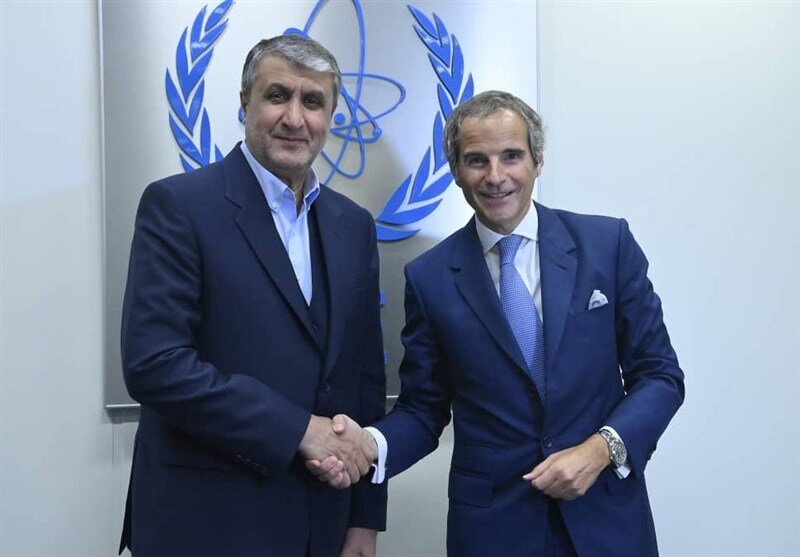Iran’s nuclear chief resumes dialogue with IAEA

TEHRAN— Mohammad Eslami, director of the Atomic Energy Organization of Iran (AEOI) who was in Vienna to attend the International Atomic Energy Agency’s General Conference met with IAEA Director General Rafael Grossi late on Monday.
No details of the meeting have been published so far.
Nevertheless, after meeting Eslami, Grossi tweeted, “Dialogue has restarted with #Iran on clarification of outstanding safeguards issues. I received Mohammad Eslami, Vice-President and Head of the Atomic Energy Organization of Iran, during @IAEAorg’s #IAEAGC.”
The IAEA director general has repeatedly recounted the allegations about what he has called nuclear activities in undeclared sites in Iran.
The claim was first made by former Israeli Prime Minister Benjamin Netanyahu and was subsequently fueled by Western media as well as the E3 (France, UK, and Germany) negotiators.
In this regard, Eslami rejected all the accusations against Iran.
Addressing the annual IAEA conference on Monday, Eslami insisted on the need for an impartial verification of Iran’s nuclear program by the Vienna-based UN body.
Eslami said, “We expect for the sake of its reputation the Agency does not allow certain elements raise again old accusations under different pretexts which were closed in 2015.”
In 2015 Iran, the five permanent members of the UN Security Council (the U.S., France, Britain, Russia and China), Germany and the European Union signed the Joint Comprehensive Plan of Action (JCPOA) on Iran’s nuclear program according to which Iran agreed to put limits on its nuclear activities in exchange for termination of economic and financial sanctions. However, the U.S. withdrew from the JCPOA in May 2018 and returned the sanctions that had been lifted under the agreement.
The AEOI chief insisted there is no undeclared nuclear site in Iran.
“There is no undeclared nuclear activity or material in Iran and all allegations are based on forged and incorrect information by the usurper regime of Israel. The Islamic Republic of Iran truly expects the Agency conduct its reporting, monitoring and verification in a more professional, impartial and independent manner,” Eslami pointed out.
He added, “We believe the Agency must avoid relying on unfounded information obtained through unreliable sources. Therefore, the Agency is expected to maintain its independence, impartiality and professionalism.”
The top nuclear official also said his country has always backed the NPT and an impartial verification of Safeguards Agreements.
“Iran has always supported complete and impartial implementation of the [nuclear] Non-Proliferation Treaty (NPT) and the Safeguards Agreements, and its track records in cooperation with the Agency are impeccable,” Eslami asserted.
Elsewhere in his address, Eslami said Iran has always been ready for negotiations and constructive interaction, emphasizing that Tehran would roll back its current remedial nuclear measures, including those related to surveillance equipment beyond the Comprehensive Safeguards Agreement and a robust verification system, only if illegal sanctions are removed and no baseless accusations are leveled against the country's peaceful nuclear program.
Eslami went on to say that based on a strategic comprehensive document, approved at the national level, the AEOI is tasked to produce 20 percent of the country’s electricity consumption from nuclear energy. He said this is in line with efforts to saying goodbye to CO2 emissions by 2050, something which has been insisted on by IAEA director general Rafael Grossi.
Leave a Comment